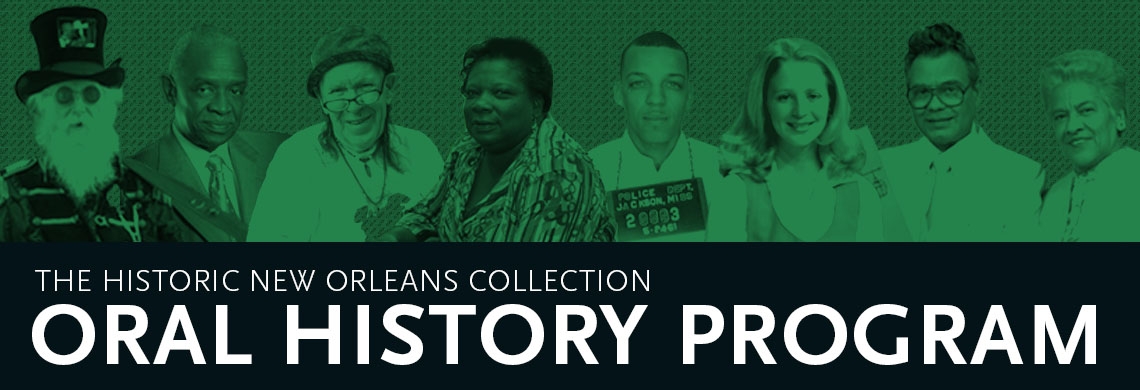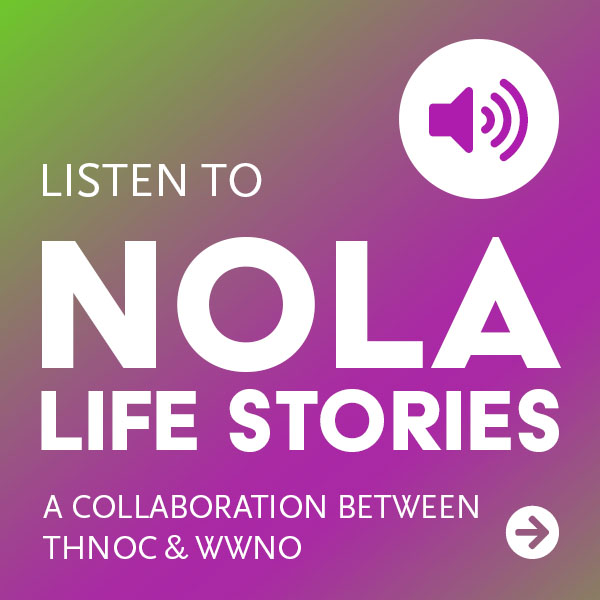The oral history program at the Historic New Orleans Collection records, collects, and preserves personal narratives that explore the perspectives, historical contexts, personalities, and motives of the individuals who have shaped our community. The program also seeks to reach out and conduct interviews with members of communities that have traditionally been underrepresented in museum and archival collections. This work provides our museum and research center visitors a more textured and balanced view of our collective memory.
The interviews are accessioned, cataloged, and preserved for future generations. Transcriptions and audio files of most of the full interviews are available through subject searches of our online catalog. Excerpted vignettes of many of the interviews, produced by National Public Radio affiliate WWNO, are available through our project pages listed below.
For more information regarding this work, please contact oral historian and senior curator Mark Cave at mark.cave@hnoc.org.
Deadly outbreaks of disease—from the earliest cases of yellow fever in the mid-18th century, to the recurring fever and cholera epidemics of the 19th century, to the flu pandemic of 1918—have devastated New Orleans over the centuries. These periods of crisis have had a profound impact on the economic and emotional well-being of the city. From the Front Line: Narratives of the COVID-19 Pandemic in New Orleans gathers stories from this most recent public health crisis. The project will capture narratives from policy makers at the city, parish, and state levels as well as nurses, EMS workers, and others interacting directly with COVID-19 patients. Additional documentation of the crisis will be done though the New Orleans Life Story Project.
The local Vietnamese-American community continues to profoundly influence New Orleans culture. Narratives of war, migration, and resettlement form the origin story of this community. The Viet Chronicle project focuses on the senior members of the Vietnamese community in Eastern New Orleans. The interviews, done primarily in Vietnamese, record life stories of many of the community’s founders, from childhood through war, migration, resettlement in New Orleans, and the rebuilding of their community following Hurricane Katrina.
The modern African American civil rights movement brought about immense cultural change in New Orleans. The fight for racial justice included voter registration drives as well as efforts to curtail discrimination in schools, on public transportation, and in businesses. Local chapters of CORE, the NAACP, and NAACP Youth Council led the movement. This oral history project, funded in part by a National Park Service grant, records testimony from individuals who were active in the fight for racial equality in New Orleans between 1954 and 1976.
The Vieux Carré, or French Quarter, has been the center of New Orleans cultural and social life since the city’s inception. Generations of artists, writers, restaurateurs, bartenders, bankers, exotic dancers, priests, fortunetellers, tourists, and others have haunted these 78 squares of brick and mortar for three centuries. Vieux Carré Memoir was created to archive the voices of those who have influenced life in the French Quarter, giving researchers an understanding of the changing nature of the Vieux Carré during the second half of the 20th century.
When levees failed during Hurricane Katrina, nearly 80 percent of New Orleans flooded. Photographs, correspondence, and other materials vital to the city’s historical record were destroyed in inundated homes throughout the region. In response, THNOC created the New Orleans Life Story Project to record and collect narratives of those who have shaped our community. The scope of the project is broad, ranging from neighborhood history to the politics and culture of the city.
In the immediate aftermath of Hurricane Katrina, THNOC collaborated with local, state, and federal agencies to interview first responders involved in the emergency. Consisting of more than 500 interviews carried out with 15 different agencies, the collection is one of the most substantial historical resources documenting what happened in New Orleans in the weeks following the storm. These narratives provide a great blueprint for further inquiry into what happened in the city during the storm and its aftermath.
Images of oil-covered pelicans and sea turtles during the 2010 Deepwater Horizon oil disaster in the Gulf of Mexico spurred urgent and emotional animal rescue efforts. THNOC partnered with agencies involved in wildlife rescue operations in Louisiana to interview officials and volunteers who planned and carried out these rescue operations. The project not only documents the response but also explores the participants’ connection to nature.
The annual Sugar Bowl “Carnival of Sports” was established in New Orleans in 1935, with its college football game as the centerpiece. In 2007 the organization donated a large collection of photographs, programs, and ephemera to THNOC that document the history of the organization and the game. In 2017 the Sugar Bowl Hall of Fame was established. In addition to longtime Sugar Bowl members, players and coaches have been included in the oral history project as part of their induction into the Hall of Fame. The interviews add a vital context to the archive, helping explain what makes this annual event such an important thread in the fabric of our community.
This project, made possible by a grant from the J. B. Harter Trust, was originally conceived to document the life and milieu of well-known New Orleans artist and curator John Burton Harter. In 2002 Harter was found murdered in his home in the city. The crime has never been solved, and many believe Harter was murdered because he was gay. In 2019 the oral history project was expanded to include gay and lesbian life stories to help document a critical turning point in LGBTQ history, as a growing number of people refuse to remain in the closet.











